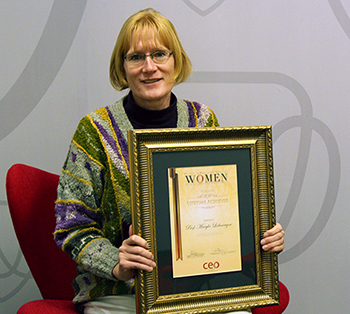Latest News Archive
Please select Category, Year, and then Month to display items
12 January 2024
|
Story Nonsindiswe Qwabe
|
Photo Sonia Small
 Since joining the UFS in 2008, Dr Grey Magaiza has worked extensively on approaches that can foster the socio-economic transformation of societies.
Since joining the UFS in 2008, Dr Grey Magaiza has worked extensively on approaches that can foster the socio-economic transformation of societies.
“The future should be one where communities can decide on their development agenda and futures. That’s the most important for me.” Dr Grey Magaiza, Deputy Director of the Centre for Gender and Africa Studies (CGAS) and Head of the Community Development programme on the Qwaqwa Campus, is passionate about capacitating communities to be agents of change and advancement. His vision for the future emphasises the empowerment of communities to take charge of their development by actively participating in decision making and the implementation of development projects that can improve their lives.
Since joining the UFS in 2008, Dr Magaiza has worked extensively on approaches that can foster the socio-economic transformation of societies. Over the years, he has crafted his research speciality into one that he is most proud of – being an interdisciplinary scientist immersed in the development of communities.
“I’m in a fortunate position of researching what I like. I say ‘fortunate’, because I’ve taken the time to understand what I’m passionate about, which is the overall field of rural livelihoods and livelihood futures – in short, community development. My research starts from an engaged university, understanding the elements that a university must use to enhance transformation and relevance to its immediate community in terms of development.”
One of the ways he has done this is by looking at social entrepreneurship as a development approach for young people in a rural setting. Through workshops with non-profit and civic organisations in Qwaqwa, Dr Magaiza has been helping these organisations to map out their needs and actively meet them through the involvement and support of external role players.
“We understand that communities are part of the national development agenda, but even that national agenda respects community knowledge and intentions and allows communities to shape their identity. A critical enabler of this is community organising. You bring back the capacity in communities to have dialogues on issues affecting them as spaces for engagement, knowledge exchange, and for people to just talk about their way forward.”
By enabling communities to define their development agenda, they can address their specific needs, challenges, and aspirations, he said. “When I look at livelihood futures, it’s quite an exciting aspect of my work – it’s like looking into a fortune tellers’ globe, because you’re not deciding for communities what they should do, but the communities themselves take those decisions.”
Researcher in Plant Breeding one of nine women on the African continent to receive acknowledgement for work in food security
2015-08-04

Prof Maryke Labuschagne |
Prof Maryke Labuschagne, Plant Breeding researcher in the Department of Plant Sciences at the University of the Free State (UFS), is one of only nine women on the African continent to receive the prestigious ‘Country Lifetime Achiever Award’ from Africa’s Most Influential Women in Business and Government Programme (MIW) this year.
During a breakfast event, CEO Communications recognised the Most Influential Women in SADC South who are Building Nations. The event took place at the Vodacom Dome in Midrand on 28 July 2015.
She received the award for her commitment and continuous contributions to food security. “I am concerned about this. We need to develop people who can go into Africa to work together for food security on the continent,” says Prof Labuschagne.
Prof Labuschagne and her students’ research focuses on the genetic improvement of food security crops in Africa, including such staples as maize and cassava. “These crops are genetically improved for yield, drought tolerance, disease, and insect resistance, as well nutritional value.”
“Food security is one of the key factors for stability and prosperity on the continent,” she says.
Apart from the fact that her research is helping to provide food for thousands of people on the continent, she is also an NRF-rated researcher, and author or co-author of over 160 articles in accredited journals.
This is not the firstaward that Prof Labuschagne has received for her work. In 2008, she was chosen as the National Agriculturalist of the Year by the Agricultural Writers Association of South Africa. In 2012, she received the Researcher of the Year award from Grain South Africa, as well as the African Union’s Kwame Nkrumah Science Award for Life Sciences on the continent.
The Country Lifetime Achiever Award is a prestigious award that recognises and honours the lifelong efforts, achievements, and contributions by individuals in their local communities. This recognition covers all sectors and countries, to create a platform where the work and involvement of extraordinary people can be displayed and noted.
About the award, Prof Labuschagne says: “It is always great to be recognised for your work.”
Elana Meyer (athlete) and Thuli Madonsela (Public Protector and advocate) have also received awards from the programme this year.